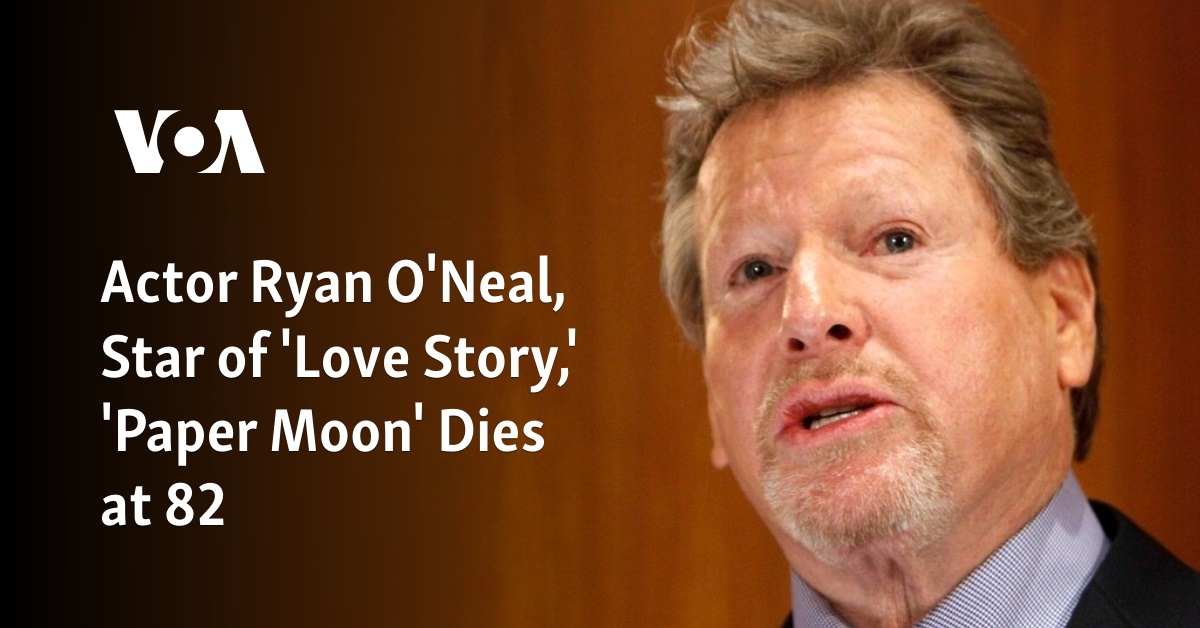Ryan O’Neal, the heartthrob actor who went from a TV soap opera to an Oscar-nominated role in Love Story and delivered a wry performance opposite his charismatic 9-year-old daughter, Tatum, in Paper Moon, died Friday, his son said.
“My dad passed away peacefully today, with his loving team by his side supporting him and loving him as he would us,” Patrick O’Neal, a Los Angeles sportscaster, posted on Instagram.
Attempts to reach O’Neal representatives were not immediately successful.
No cause of death was given. Ryan O’Neal was diagnosed with prostate cancer in 2012, a decade after he was first diagnosed with chronic leukemia. He was 82.
“My father, Ryan O’Neal, has always been my hero,” Patrick O’Neal wrote, adding, “He is a Hollywood legend. Full stop.”
O’Neal was among the biggest movie stars in the world in the 1970s, working across genres with many of the era’s most celebrated directors including Peter Bogdanovich on Paper Moon and What’s Up, Doc? and Stanley Kubrick on Barry Lyndon. He often used his boyish, blond good looks to play men who hid shadowy or sinister backgrounds behind their clean-cut images.
O’Neal maintained a steady television acting career into his 70s in the 2010s, appearing for stints on Bones and Desperate Housewives, but his longtime relationship with Farrah Fawcett and his tumultuous family life kept him in the news.
Twice divorced, O’Neal was romantically involved with Fawcett for nearly 30 years, and they had a son, Redmond, born in 1985. The couple split in 1997 but reunited a few years later. He remained by Fawcett’s side as she battled cancer, which killed her in 2009 at age 62.
With his first wife, Joanna Moore, O’Neal fathered actors Griffin O’Neal and Tatum O’Neal, his co-star in the 1973 movie Paper Moon, for which she won an Oscar for best supporting actress. He had son Patrick with his second wife, Leigh Taylor-Young.
Ryan O’Neal had his own best-actor Oscar nomination for the 1970 tear-jerker drama Love Story, co-starring Ali MacGraw, about a young couple who fall in love, marry and discover she is dying of cancer. The movie includes the memorable, but often satirized line: “Love means never having to say you’re sorry.”
The actor had at times strained relationships with three of his children, including estrangement from his daughter, squabbles with son Griffin and a drug-related arrest sparked by a probation check of his son Redmond. The personal drama often over-shadowed his later career, although his attempts to reconcile with Tatum O’Neal were turned into a short-lived reality series.
Love Story is what made him a movie star.
The romantic melodrama was the highest-grossing film of 1970, became one of Paramount Pictures’ biggest hits and collected seven Oscar nominations, including one for best picture. It won for best music.
O’Neal then starred for Bogdanovich as a bumbling professor opposite Barbra Streisand in the 1972 screwball comedy What’s Up, Doc?
“So sad to hear the news of Ryan O’Neal’s passing,” Streisand, who also starred with O’Neal in the 1979 boxing romcom The Main Event, posted on Instagram. “He was funny and charming, and he will be remembered.”
The year after What’s Up, Doc? Bogdanovich cast him in the Depression-era con artist comedy Paper Moon.
In it, O’Neal played an unscrupulous Bible salesman preying on widows he located through obituary notices. His real-life daughter, Tatum, played a trash-talking, cigarette-smoking orphan who needs his help — and eventually helps redeem him.
Although critics praised both actors, the little girl’s brash performance overshadowed her father’s and made her the youngest person in history to win a regular Academy Award. She was 10 when the award was presented in 1974.
The elder O’Neal’s next major film was Kubrick’s 18th century epic Barry Lyndon, in which he played a poor Irish rogue who traveled Europe trying to pass himself off as an aristocrat.







